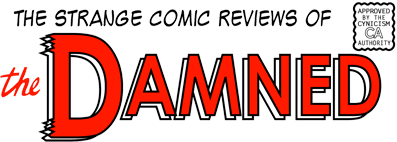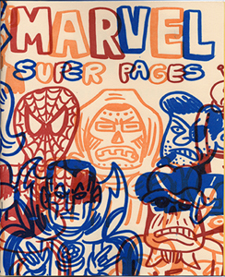Number One in an Open-Ended Series of Thoughts on the Aesthetics of Comics
If there is one fact that recent discussions have grudgingly revealed to the informed reader, it is that the language and conceptual space which we use to discuss comics is woefully inaccurate and pitifully sparse.
The Comics Journal has recently run two fascinating interviews with individuals working on the exact opposite of the aesthetic spectrum: Ivan Brunetti and Brian Michael Bendis. Both men discussed their craft and the overriding principles behind their body of work, and yet it seemed at times as if they could have been talking about two totally different artforms. True, even under the best of circumstances a high practitioner of ascetic formalism and a prolific popular storyteller would probably have little in common - but it would at least be nice to be able to infer that they share the same medium. The dearth of accessable critical discourse is a crippling handicap towards the medium's broad aesthetic advancement.
I think that the problem rests on the fact that comics is a hybrid medium. Until very recently, whenever comics criticism has popped up, it has taken a hybrid form - by adopting either literary or cinematic lexicons and basically shoehorning the content to fit the language. While it is true that both traditions have much to contribute to our understanding of the medium, it is also true that inexact literary analogies and didactic cinematic correlaries have done a lot to hinder both the critical and popular discourse.
The elephant in the drawing room whenever anyone brings the subject up is Scott McCloud's Understanding Comics - a great book that was also an unmitigated failure in terms of the author's stated goal, i.e. to create an ongoing critical dialogue on comics in the confines of the medium itself. I think the fact is that although McCloud presented a number of interesting ideas in a cogent and thoughtful format, he essentially shot himself in the foot by presenting them in the ostensible guise of a Grand Old Tome, which could either be accepted as absolute truth or rejected as foolish apostasy. Of course he didn't intend such a schism, but it did occur, and as a result anyone who tries to discuss the broad scope of comics critically almost has to dismiss the book entirely before they begin.
But even if you give McCloud the credit for trying to start the dialogue, you are still left with the fact that he didn't do much in the way of exploring the language that needs to be developed before such a discussion can even occur. Too often, any meaningful discussion between professionals devolves into mere craft (and certainly there's a lot of craft masquerading as criticism in UC). Craft is important but ultimately only as a small facet of a larger organism.
Strangely enough, despite the domination of those two fields on the medium, the third obvious contributor, the critical perspective of "fine" art, is almost totally absent from any comics dialogue. This probably says more about the insulated nature of fine art than comics. But that's one less set of baggage - preconceptions, limitations and jargon - that we shall ultimately have to jetison.
I believe that if you conceive comics as merely an annex to literature or an offshoot of cinema, you are criminally unprepared and essetially unqualified to undertake any rigorous discussion of comics aesthetics, craft or history. If you're not ready to discuss comics as comics, you aren't ready to discuss comics, period.


Marvel Super Pages
This review owes its existence to my homie Neilalien, without whom I would probably never have known this book existed. If you don't already own a copy you're probably out of luck until someone puts it up on Bittorrent. Only 200 were printed, and judging from the number on the inside cover I got one of the last ones. This at least makes up for me not picking up that copy of Cooper Skeber #2 all those years ago when I saw it in the store . . .
It seems impossible to discuss Johnny Ryan's work without presenting some sort of caveat, but I bristle at the notion that such a talented cartoonist needs any sort of excuse. His chosen subject matter just happens to be graphic scatology and pornographic crudeness. Perhaps the most dismissive thing certain people can find to say about Angry Youth Comics is that it's juvenile, but anyone for whom that is the be-all-and-end-all of put-downs is in actuality just stating a fact. Johnny Ryan is to juvenilia as Crumb is to women with big asses: he elevates a freakish preoccupation into high art. It's OK not to like it if you don't find it to your tastes, but don't dismiss it out of hand.
Scatology has a fine tradition in the comics. Certainly, most children are at some point fascinated by the notion of societal taboos which they do not have the capacity to understand: bodily excretions, sex, death, incest, cannibalism. Oftentimes these preoccupations predate the capacity for language: by the time you know how to write, you don't want to write about poop anymore. So, that's where cartooning comes in - anyone can draw poop. It's easy. Just grab a brown crayon and go to town.
To violate societal norms once is scandalous and profound. To violate such norms twice is merely pique. But to do so repeatedly, and indeed to make such serial inversion into your raison d'etre, remains an unnerringly accurate method of cultural explication. Just look at how well Catch-22 holds up (really well), and look at how shocked people were when Brett Easton Ellis wrote American Psycho just a few short years ago. When it comes to holding an unflattering mirror up to society, nothing succeeds like excess.
Ryan's already-prodigious body of work exists as a necessary bromide to all the self-conscious and explicitely serious cartoonists out there, all the sad-boy caricaturists and the conscientious graphic novelists. Taken singularly his work may not add up to much, but together it becomes powerfully suggestive satire. Which is not to say that poor ol' Loady McGee is ever - God forbid - profound, but the incessant lack of profundity in Loady's adventures creates a definite ironic weltschmerz that sets the work in sharp contrast with some of the more pedantically profound cartoons of our era.
Marvel Super Pages really hasn't a lot to do with the characters involved. All you need to know about Iron Man to enjoy Ryan's take is that the chracter wears a suit of armor and really likes to drink. The Vision is a robot with a pipe wrench for a penis and the Scarlet Witch is an oversexed mutant. Captain America is deeply closeted with a flat-chested Asian girlfriend. You get the idea. if Ryan weren't such a canny caricaturist, it might get old, but he's got an intuitively loose and appealing style which belies the complaint that he can't draw. In another universe he'd be a storyboard artist in the "Golden Age" of animation - his lines are clean and his figures are loose. He’d be the one who drew all the suspiciously-well-drawn Tijuana Bibles in his off-time – stuff like Mickey Mouse and Blondie having anal intercourse. The quiet mastery of craft underscores his canny storytelling, and this is why the endless stream of shit-and-cunt jokes remain so engrossing.
So let us all salute Johnny Ryan, one of our most vital and bold cartoonists. I don't know how long he can keep it up - honestly, there is no telling how long this will remain funny - but until something better comes along I'm just glad to be along for the ride.
UPDATE: It looks as if, against all my expectations, they might still have one or two copies for sale here. Go get ‘em, Tiger.





No comments :
Post a Comment